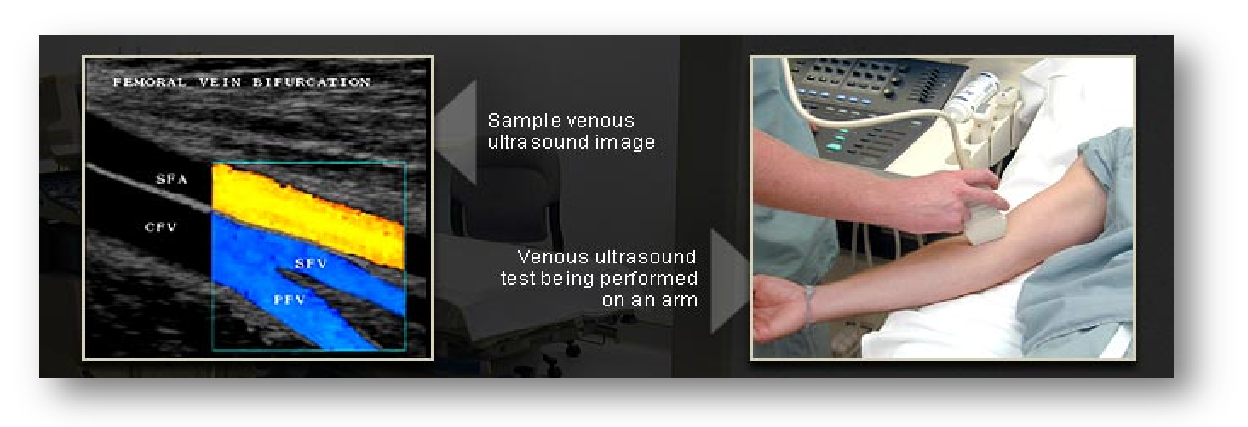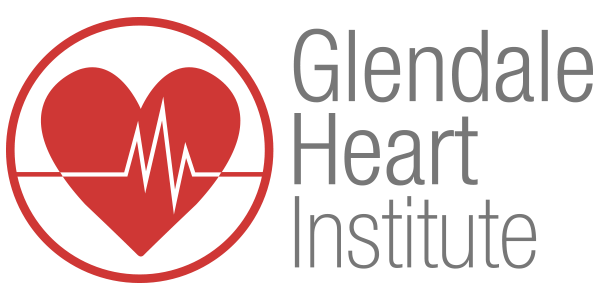Venous Doppler is a special ultrasound technique that evaluates blood as it flows through a blood vessel, including the body’s major arteries and veins in the abdomen, arms, legs and neck.
Who performs the procedure?
The procedure is performed by a Sonographer with the assistance of a Radiologist.
Why is this procedure performed?
This procedure is performed to capture images of your veins and arteries.; The results will let your doctor know if there are any:
• Blockages to blood flow in major arteries and veins
• Narrowing of vessels
• Tumors and congenital malformations
Is there any prep for this procedure?
No prep is needed for this procedure.
What can I expect before the procedure?
Once you arrive at the Imaging Center, you will have to register at the front desk.; Please have your insurance information ready at this time. After registration, you will be taken to the Ultrasound Department where you will be instructed to remove all clothing and jewelry in the area to be examined.
What can I expect during the procedure?
Who performs the procedure?
The procedure is performed by a Sonographer with the assistance of a Radiologist.
Why is this procedure performed?
This procedure is performed to capture images of your veins and arteries.; The results will let your doctor know if there are any:
• Blockages to blood flow in major arteries and veins
• Narrowing of vessels
• Tumors and congenital malformations
Is there any prep for this procedure?
No prep is needed for this procedure.
What can I expect before the procedure?
Once you arrive at the Imaging Center, you will have to register at the front desk.; Please have your insurance information ready at this time. After registration, you will be taken to the Ultrasound Department where you will be instructed to remove all clothing and jewelry in the area to be examined.
What can I expect during the procedure?

You will be lying on your back while a gel is applied to the area of the body being studied.; The Sonographer will then press the transducer firmly against the skin and move it back and forth over the area of interest.; You may actually hear pulse-like sounds that change in pitch as the blood flow is monitored and measured. Several images are captured during the procedure. There may be a little discomfort from pressure as the transducer is pressed against the area being examined.
What can I expect after the procedure?
After an ultrasound exam, you may be asked to dress and wait until the ultrasound images are reviewed. You should be able to resume your normal activities.
Are there any risks to this procedure?
There are no known risks with this procedure.
Are there any alternatives to this procedure?
No alternatives are available for this procedure.
What can I expect after the procedure?
After an ultrasound exam, you may be asked to dress and wait until the ultrasound images are reviewed. You should be able to resume your normal activities.
Are there any risks to this procedure?
There are no known risks with this procedure.
Are there any alternatives to this procedure?
No alternatives are available for this procedure.
Cardiac Specialty Care
• Structural Heart Disease
• TAVR
• CardioMEMS (Heart Failure)
• PFO Closure
• TAVR
• CardioMEMS (Heart Failure)
• PFO Closure
• Coronary Intervention
• Complex Higher-Risk (And Indicated) Patients (CHIP) Angioplasty
• Atherectomy
• Impella and ECMO Support
• Complex Higher-Risk (And Indicated) Patients (CHIP) Angioplasty
• Atherectomy
• Impella and ECMO Support
• Peripheral Angioplasty
• Varicose Vein Treatment (Venous Ablation)
• DVT thrombectomy - IVC filter
• Carotid Stenting
• Varicose Vein Treatment (Venous Ablation)
• DVT thrombectomy - IVC filter
• Carotid Stenting
• Rhythm Management
• Pacemaker
• Holter Monitoring
• Exercise Stress Test
• Echocardiography
• Nuclear Stress Test
• Enhanced External Counterpulsation (EECP)
• Pacemaker
• Holter Monitoring
• Exercise Stress Test
• Echocardiography
• Nuclear Stress Test
• Enhanced External Counterpulsation (EECP)
